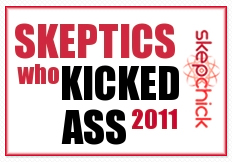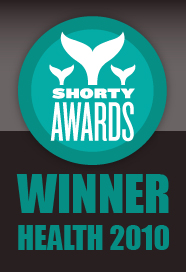According to the World Homeopathy Awareness website the focus of this years’ festivities will be “Mental Well-being, Body and Mind in Balance”.
Whatever that means.
The week will also reflect on the memory of the 255th anniversary of the Birth of Dr. Samuel Hahnemann, the creator of homeopathy.
Homeopaths and homeopathy supporters from around the globe will join forces in April during World Homeopathy Awareness Week (WHAW). The website lists many suggested activities and events, such as handing out fliers, promoting homeopathy through television and radio, organising musical concerts/stage concerts/skits/plays, etc with a homeopathic theme. Which all seem pretty harmless and twee, until you get to this one.
“Contact other homeopaths in your area and organize free clinics for the poor.”
Why? Are the poor thirsty? Or need a bath? Why else would they be wanting expensive water?
I also plan to get the word out about homeopathy during WHAW.
And the word is bollocks.
But seriously, as sceptics we should make an effort to publicise homeopathy during this time to let people know it does nothing and it contains nothing. It’s water, or whatever else was used to dissolve the active ingredient, which has long disappeared by the time it appears on the shelf.
I plan to dig up some of the position statements from organisations concerned with the harm that homeopathy can do.
Many of us are familiar with the one released by the WHO in response to an open letter from Sense About Science imploring them to take a position on homeopathy. Their response was;
The WHO DOES NOT recommend the use of homeopathy for treating HIV, TB, malaria, influenza and infant diarrhoea
Dr Mario Raviglione, Director, Stop TB Department, WHO: “Our evidence-based WHO TB treatment/management guidelines, as well as the International Standards of Tuberculosis Care (ISTC) do not recommend use of homeopathy.”
.Dr Mukund Uplekar, TB Strategy and Health Systems, WHO: “WHO’s evidence-based guidelines on treatment of tuberculosis…have no place for homeopathic medicines.”
.Dr Teguest Guerma, Director Ad Interim, HIV/AIDS Department, WHO: “The WHO Dept. of HIV/AIDS invests considerable human and financial resources […] to ensure access to evidence-based medical information and to clinically proven, efficacious, and safe treatment for HIV… Let me end by congratulating the young clinicians and researchers of Sense About Science for their efforts to ensure evidence-based approaches to treating and caring for people living with HIV.”
.Dr Sergio Spinaci, Associate Director, Global Malaria Programme, WHO: “Thanks for the amazing documentation and for whistle blowing on this issue… The Global Malaria programme recommends that malaria is treated following the WHO Guidelines for the Treatment of Malaria.”
.Joe Martines, on behalf of Dr Elizabeth Mason, Director, Department of Child and Adolescent Health and Development, WHO: “We have found no evidence to date that homeopathy would bring any benefit to the treatment of diarrhoea in children…Homeopathy does not focus on the treatment and prevention of dehydration – in total contradiction with the scientific basis and our recommendations for the management of diarrhoea.”
Of course it might also be time to remind people about the recent findings by The House of Commons Science and Technology Committee in the UK on homeopathy. In a 273 page report, they concluded
* The UK National Health Service should cease funding homeopathy
* No further clinical trials of homeopathy should occur.
* Evidence shows homeopathy doesn’t work.
* Explanations for why homeopathy works are “scientifically implausible.”
* Committee viewed homeopathy as placebo.
The UK Health Protection Agency also published a statement saying they do not recommend homeopathy for malaria prevention.
“There is no scientific proof that homeopathic remedies are effective in either preventing or treating malaria. In addition, the Faculty of Homeopathy does not promote the use of homeopathic remedies for disease prevention and note that their use in malaria prevention is unlikely to be acceptable to insurance providers.”
But in an undercover investigation by Simon Singh and Sense About Science, a researcher pretending to be travelling to malarial affected areas was advised that homeopathy was effective, by homeopaths and pharmacy assistants. At Nelsons Pharmacy in London, which claims to be Britain’s biggest manufacturer of homeopathic remedies she was advised of the remedies;
“They make it so your energy doesn’t have a malaria-shaped hole in it so the malarial mosquitos won’t come along and fill that in.”
Are you serious? You have to be making that up.
Of course, if homeopathy is just water then it won’t hurt you right? Well no, as long as you are also receiving evidence based, effective treatments. Otherwise, it can be lethal.
I plan to make as many people as possible aware of WHAW.
Aware that it’s complete bollocks.
Browse Timeline
- « Sceptics on Saturday with me & Dr Krissy Wilson.
- » The AVN knocked back from advertising in mums & babies publication





